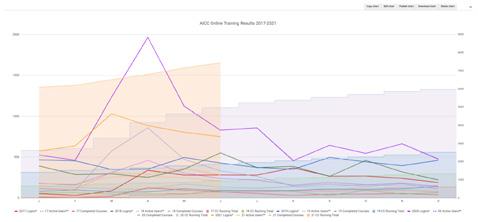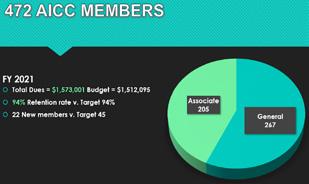
13 minute read
AICC 2021 ANNUAL REPORT
—Bob Cohen, president, Acme Corrugated Box
Advertisement
• How you’re taking care of your employees—customers care bout that! • That you’re there to meet their needs and that their concerns are important to you.
At Acme, “we knew we had to keep producing so we could keep providing boxes to the food service industry,” Kochie says. Acme communicated quickly and often to keep customers informed and up to date on what was happening with the company.
Addressing Company Needs
Addressing company needs relates to issues such as how you will communicate with employees, customers, and others, how you will ensure that data and other employer resources are kept safe, how you will ensure continuous business operations, and, closely related, how you will project your bottom line.
Addressing Community Needs
Different types of organizations impact the community in different ways. Health care organizations, for example, have an obvious impact on the community and those in it.
Manufacturing companies also have community impacts, though. This might include such things as potential environmental impacts related to a disaster and how they are being addressed, economic impact if the company has to reduce staff or operations, or philanthropic contributions and participation in community-related corporate social responsibility initiatives.
In each of the above areas—employees, customers, company, and community —manufacturing organizations should consider: • Areas where they face risk. What types of impacts could threaten the viability of your company? • Critical business functions that need to be able to operate no matter what. • Identify areas where you can proactively purchase and put in
place safety- and communication-related technology, and other resources based on your identified risks, to support a quick and flexible response to disaster.
There are certain things every company can do now to prepare for future impacts. For instance, making sure that all data is backed up remotely. Ensuring that your business insurance policies provide the broad protections that you may need. Plan into your budget emergency funds that would be required to keep your company going for some specified period of time. In addition, identifying the go-to people and their related responsibilities for responding during a crisis, and the communication methods that would be used if current methods fail, can help you be in a better position to respond to all of your key stakeholders.
Learning From Each Event
An important best practice for companies dealing with crisis situations is not to move beyond the crisis without making an effort to learn from the experience. Kochie notes, “The pandemic definitely yielded some new insights about how to prepare for the worst.”
One of those insights was that, yes, employees could work from home if need be. When the pandemic hit, he says, more than 90% of Acme’s office staff were suddenly working from home—“something that, before the pandemic, many would have likely said was impossible.”
Reaching out to others—both during and after a crisis situation—can also be very instructive and very helpful, Kochie says. He found regularly scheduled calls with colleagues to be invaluable.
No, you will not be able to proactively identify every specific crisis or calamity that might impact you, but what you can do is be prepared generally to hit the ground running when the worst happens.
Kochie says, “We never could have predicted or prepared for the pandemic. Yet, by and large, we have survived it.” He credits the entire leadership team and outstanding workforce for their ability to weather this storm and to prepare for whatever may lie ahead.
Lin Grensing-Pophal is a Wisconsin-based freelance writer and a frequent BoxScore contributor.

AICC completed its 2021 fiscal year on June 30. It was certainly an unusual year, one that began in the full grip of the coronavirus pandemic and ended with some hope in vaccines but concern with a rising Delta variant. AICC members adjusted to the new realities of COVID-19 and worked mightily to keep their employees safe, boxes in production, and machines and systems in operation. AICC programs that began with the lockdowns in spring 2020 continued, such as the weekly COVID Zoom conference and the Daily COVID Update webpage. As the year wore on, the topics and frequency of AICC’s member support efforts adjusted to the changing environment and to meet members’ needs. National Meetings and Special Events As in the previous fiscal year, the pandemic scuttled an AICC national meeting, one scheduled for fall 2020—more than just an AICC meeting. September 2020 2021 ANNUAL REPORT should have seen AICC and TAPPI jointly host SuperCorrExpo in Orlando,
Strong market, strong programming, high Florida. The event was postponed to August 2021. Despite the cancellation of AICC’s spring 2020 meeting in La Costa, California, and the postponement of demand, glimpses SuperCorrExpo, AICC did conceive a way to keep a popular member deliverable. Tours of nearby box plants and supplier of normal operations are hallmarks of most AICC in-person meetings. To keep that particular form of entertainment and education, AICC instituted a series of virtual plant tours. Members had the great pleasure to “visit” Dusobox, The Boxmaker, Utah Paperbox, Wasatch Container, and Packrite thus far in 2021. AICC appreciates these members for “opening” their

doors and expects to conduct more virtual tours through the balance of this year into 2022.
During this time, AICC’s Emerging Leaders (EL) developed a “regional ambassador” program to create and highlight EL events across the country and to support AICC’s regional directors. They also began a monthly EL newsletter and conducted a free quarterly leadership webinar with various speakers.
When SuperCorrExpo was postponed, we were all wondering: When will AICC members meet in person again? By the fall and winter, we had all become pros at Zoom conferences and communicating virtually. Doing so was reassuring, to be sure, but just not the same as being together. News of COVID-19 vaccines began to create hope that we could travel and book meetings once again.
By the beginning of 2021, vaccines were being administered. AICC’s board of directors made the decision to proceed with the Southeast Summit at the Grandover in Greensboro, North Carolina, March 30–31. Southeast Regional Director Ben DeSollar was instrumental in making that happen. It was great to see 70 members and friends reunite. There was a tremendous spirit at the event, one that the shared tribulations of operating during a pandemic can bring. In typical AICC format, there were education and networking components to the summit. Unfortunately, the planned golf outing was done in by foul weather.
Holding the Southeast Summit convinced the AICC board of directors of two things: that a meeting could be safely staged, and that AICC members were ready to travel and get together. As the vaccine program across the country picked up speed, so, too, did the certainty that AICC would hold its national Spring Meeting in Amelia Island, Florida.
On Tuesday, April 27, an emotional Mike D’Angelo opened the general session of the Spring Meeting, welcoming 350 attendees on site and another 150 attending virtually. AICC Chairman Jay Carman remarked that the meeting had a spirit akin to that experienced by members when AICC held its 2001 fall meeting in the aftermath of 9/11. Gratitude and the sense that, out of something tragic, we once again emerged stronger. It truly felt like a rebirth of the industry as members from across the United States came to Amelia Island. Due to travel restrictions, our Canadian and Mexican colleagues unfortunately were missing. AICC takes this opportunity to express gratitude to its members to the north and the south for their participation and contribution from afar toward what AICC accomplished for membership during this year.
Throughout the early months of 2021, the rescheduled SuperCorrExpo was looming on the horizon. Postponed from September 2020 to August 2021, AICC’s board of directors and TAPPI’s Corrugated Packaging Council, along with the staff of both organizations, continually took the pulse of the respective memberships, communicated, coordinated, and ultimately decided to proceed with the event. As AICC’s fiscal year ended, plans were well underway for SuperCorrExpo. The event was held successfully and was conducted safely. Thanks to all who attended, and a special thank-you to AICC and TAPPI staff for staging the exhibition under the challenging conditions at the time. Coverage of SuperCorrExpo can be found in the September/October issue of BoxScore. Or you can await the FY 2022 summary article, which will mention the SuperCorrExpo highlights and results one year hence.
Education and Training
AICC’s partnership with The Packaging School (TPS) to host AICC’s education programming online has now been a four-year success. With the advent of the pandemic, member use of AICC’s online education exploded. As members settled into a new normal, the number taking AICC’s courses online naturally subsided, but it remained well above pre-pandemic levels. AICC currently offers 113 courses through TPS, with more than 20 available in Spanish. AICC is adding a minimum of 10 new courses each fiscal year. For those who may not be aware, every employee of every AICC member company is able to access these courses at no cost, a member benefit included with the company’s annual dues.
The strength of AICC’s online education was confirmed through the interest that other associations expressed in gaining access to some of the programming. The Latin American Asociación de Corrugadores del Caribe, Centro y Sur América (ACCCSA), and AICC entered into an agreement that granted ACCCSA members access to 20 Spanish-language AICC courses through TPS. AICC also entered into an agreement with the National Wooden Pallet and Container Association (NWPCA), jointly offering a program through TPS that combines the NWPCA Pallet Design System training with AICC’s Corrugated Basics courses for the benefit of members of both associations.


The creation of these programs is consistent with the AICC board of directors’ call for AICC to seek out and maintain mutually beneficial relationships with other associations in the packaging space.
AICC has also established a prospect site, which provides four TPS courses, so that nonmembers can easily access and sample one of the value propositions available with an AICC membership. AICC members averaged 696 logins per month during the fiscal year. Through June 30, members have completed 7,438 courses since the AICC/TPS partnership was introduced in spring 2017.
Foundation for Packaging Education
In spring 2020, AICC’s board of directors approved the creation of a second 501(c)3 education foundation as a complement to the International Corrugated Packaging Foundation (ICPF). The newly created Foundation for Packaging Education (www.packaginged.org) was launched in November 2020 with the mission to ensure that there will always be a source of funds to sustain AICC and other entities’ education programming for the benefit of those who are already employed in the paper-based packaging industry. In contrast, ICPF’s support has been oriented toward two- and four-year education institutions that offer packaging-related curricula. As of the close of the fiscal year, the Foundation for Packaging Education had $1,139,008 in cash on hand and pledges totaling $1,415,700. This is due to the support and foresight of the foundation’s inaugural donors as of June 30: Michigan City Paper Box, Bay Cities, Jamestown Container, Oklahoma Interpak, SUN Automation Group, StandFast Packaging Group, DeLine Box, Harris Packaging, Package Crafters, Packaging Express, Wasatch Container, Central Package & Display, BCM Inks, Buckeye Boxes, L.D. Davis, Welch Packaging Group, Adducco Communications, McLean Packaging, Ox Box, JB Machinery, Kolbus, Haire Machinery, Arvco Container, Equipment Finance Corp., Southern Missouri Container, Akers Packaging Service, Tavens Container, Pamarco/Absolute, Royal Containers, Athena SWC, and A.G. Stacker.
The AICC board of directors also approved a “million-dollar match” to be transferred to the foundation when pledges reached $1 million. The funds were transferred to the foundation in June (more on this later in the financial portion of this report summary).
Among the 113 courses now available at AICC’s Packaging School, included are courses created by AICC’s Education Investor partners: Fosber America, BCM Inks, SUN Automation Group, JB Machinery, Pamarco, Absolute Engineering, Printron, EFI, Krueger, Bobst North America, HP, and Stafford Corrugated Products. These partners contribute financial resources, technical materials, subject-matter expertise, and the necessary time and oversight to ensure technically viable, educationally appropriate programming. AICC appreciates the partnership of these member companies.
Due to the pandemic, AICC’s education Xperience event was not held during the fiscal year. The two previous iterations, Digital Printing and E-Commerce, had proven to be very popular. As such, AICC is looking forward to renewing the Xperience in the new year.
Publications and Advertising
Revenue totaled $290,056, down from FY 2020. The components of the total

were made up of $275,246 in website and print (BoxScore) advertising and $14,910 in publication sales. This represents a reduction in BoxScore advertising and about the same revenue for website advertising compared to the previous year. The reduction in BoxScore advertising is explained by several companies reducing the annual number of inserts compared to previous years, clearly a result of the uncertainty that so many members had when planning their budgets for 2021.
There were solid sales across the range of AICC publications, but AICC’s Salary, Benefits & Hourly Wage survey was by far the most popular publication. Last year, AICC transitioned to all downloadable publications. There is no longer hard copy of any AICC publication available for sale.
AICC Canada
AICC Canada comprises Ontario, Québec, and the Maritime provinces. It is run by an independent board of directors, led by Don Duplantis of Royal Containers in Brampton, Ontario, who serves as AICC Canada president. The lockdowns in Canada lasted longer than in many places in the U.S., and AICC Canada programming was limited as a result. AICC Canada did refresh and launch its website. AICC Canada publishes its own regional membership directory and biennial salary survey. Terri-Lynn Levesque of Royal Containers serves as the Canada director on the AICC U.S. board of directors. For more information on the activities of AICC Canada, contact Renee Annis, administrative director, at 674-264-8674 or rannis@aiccbox.ca, or visit www.aiccbox.ca.
AICC México
AICC México is celebrating its 20th anniversary in 2021. Despite the pandemic, it has been a very active emerald anniversary year. Reaching the membership virtually, AICC México staged 13 webinars, six seminars, and three forums, which drew nearly 1,600 participants. The membership continues to grow, with the total number of member companies approaching 50. AICC México also has a very robust and active EL program. AICC México is represented on AICC’s board of directors by Juan-Javier Gonzalez of Cartró SAPI de CV in Tepotzatlán, Mexico. For more information on the activities of AICC México, contact AICC México Director Maria Frustaci at 703-535-1382 or mfrustaci@aiccbox.org, or visit www.aiccmx.com.
Executive, Governance, Cooperation, and Advocacy
AICC continued its traditional collaboration with related industry trade associations, including the Technical Association of the Pulp and Paper Industry (TAPPI), the Fibre Box Association (FBA), Flexographic Technical Association (FTA), the American Forest and Paper Association (AF&PA), and others. Internationally, AICC maintains membership in the International Corrugated Case Association (ICCA), where it is ably represented on its board of directors by AICC Overseas Director Kim Nelson of Royal Containers. AICC is a participant at many of these organizations’ meetings each year. Unfortunately, several were cancelled due to the pandemic, including FBA and ICCA. AICC also maintains a close relationship with the U.K. Sheet Plant Association (SPA), the European Federation of Corrugated Board Manufacturers (FEFCO), and the aforementioned ACCCSA.
In terms of advocacy, AICC has partnership on Capitol Hill through its affiliation with the Council of Manufacturing Associations (CMA) which is an arm of the National Association of Manufacturers (NAM). Through the CMA, the interests of AICC’s manufacturing members are voiced. AICC is also a member of the Small Business Legislation Council (SBLC). D’Angelo became a member of the SBLC board of directors in 2021. As its name implies, the SBLC advocates on behalf of small businesses. The AF&PA advocates on paper and forestry related issues.
These partnerships have come in handy during the pandemic, as AICC has been able to receive information from these organizations regarding worker safety, vaccinations, etc. And with the change in the U.S. Congress and the presidency in January, AICC receives information regarding all the new legislative initiatives and executive orders. Directly in our











